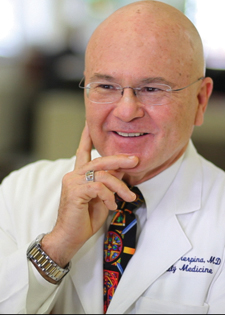 By Victor S. Sierpina, MD
By Victor S. Sierpina, MD
There is a well written, meticulously documented book by Baylor Professor Jeff Levin, Religion and Medicine: A History of the Encounter Between Humanity’s Two Great Institutions.
Dr. Levin, an epidemiologist and religious scholar has spent his career investigating and documenting the dialogue, and the conflicts between medicine and religious traditions, their synergies and their tensions.
A quote from the book that characterizes some of this dynamic:
“Medicine, in the final analysis, calls the shots and jealously guards its turf, uneasy about sharing decision-making authority with faith even in matters where said domain possesses expertise that better equips it than medicine to make informed judgments. Where faith maintains a say (e.g., in bioethics, healthcare chaplaincy, medical missions) it is only because medicine lets it. …..the dynamics of the faith- medicine relationship, as manifested in all sorts of research and scholarly endeavors and in all manner of professional activities, is complex and a function of dynamic forces both historical and political.”
A few centuries ago, religious and theological concepts dominated an era when medicine offered little to allay the ravages of plague, cholera, and other diseases of mankind. Because medicine at that time was impotent and the therapies offered not only ineffective but often dangerous, traditional religion with its prayers and rituals filled the breach. More or less.
If a child was ill, helpless parents could at least pray and hope for God’s mercy to deliver the child from a high fever or other affliction. Maybe the child got better.
As medicine improved, we developed and understood the germ theory, developed antibiotics, immunizations, and other powerful and effective therapies. Religion and its various rituals and trappings seemed obsolete, quaint, even irrelevant.
So why in an era of ever more complex, targeted technologies for not only infectious disease but cardiovascular disease and cancer would we need to add to these modern methods any call for religion and spirituality and training on how to do this in the clinical care setting?
Perhaps part of the answer can be found in a citation by Dr. Dale Matthews from The Faith Factor found in Levin’s final chapter:
“The prospect of discussing religion—particularly subjective spiritual experiences—makes many doctors feel uncomfortable. If doctors are asked to pray with patients—in the examining room, before surgery, at the hospital bedside—most feel completely out of their “professional” realm. Yet many people urgently want to talk about their faith when they are sick. When illness brings patients into our offices, they seek relief of their physical symptoms, but many seek more. They want to know: “Why am I sick. Am I being punished? What does God have to do with this? Is it okay to ask God to heal me? Will I make any difference if I do?”
No doctor can answer these questions definitively, but I believe we can learn to listen openly and compassionately to our patients’ spiritual concerns. If we are willing and the situation is appropriate, we can do more, perhaps pointing out a scripture verse, perhaps sharing a prayer or insights from our own faith journeys or encouraging counsel with a member of the clergy.”
Increasingly, people identify themselves as spiritual but not religious. This generally means though they may be culturally Jewish or raised in a Christian or other faith tradition, they do not actually practice or attend services regularly while still adhering to at least some of their faith-based tenets. Many however do stay active and grow their faith-based practices through regular prayer, communal worship, personal meditation, and other rituals and practices.
When they are ill themselves or have others in their acquaintance suffering from medical problems, people naturally gravitate to prayers of supplication and affirmation of hope to support those that are ill and their families. Except for a few religions that reject the interventions of modern medicine, the vast majority of religious people support the use of medical practices as well as spiritual support.
Medical professionals are not necessarily well trained to address the multiplicity of faiths and belief systems and religious practices of our patients..
Ultimately, health care providers need to be sensitive to the variety of religious experiences and beliefs of our patients. We need to be respectful of the power these play in their lives and deaths. This helps us connect with their deepest humanity. Doing so also acknowledges the not so hidden fact that modern medicine with all its miracles is not infallibly effective and perhaps some divine intervention might on occasion be helpful. We need all the help we can get.


